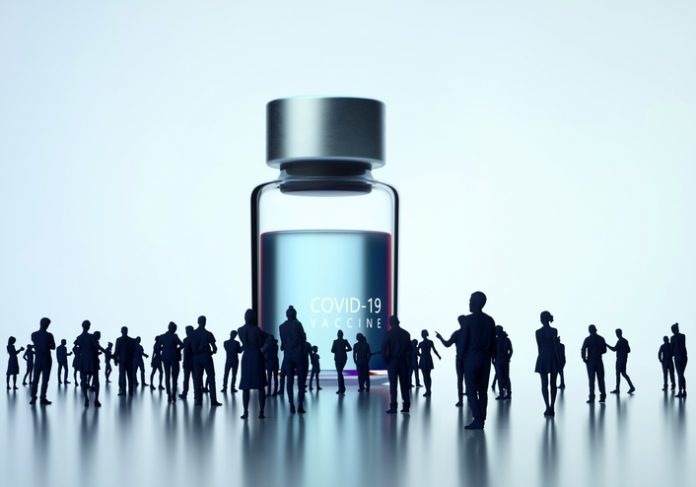After more than 15 months entrenched in the COVID-19 pandemic, 182 million Americans have received at least one shot of the vaccines, as of the first week of July.
What about the remaining Americans? According to news reports, the nation is experiencing a slowdown for appointments to get the shot and the number of daily doses administered is trending down from a peak of 4.6 million on April 10 to about 3 million today.
Have we reached “peak vaccination?” It sure seems that way, and as fewer people seek to get vaccinated, a dominant narrative has emerged: Lack of compliance could be due to a number of Americans who simply don’t want to get vaccinated, also known as “vaccine resistance.”
Biden’s Door-to-Door Campaign
The Biden administration seems to be buying into the notion of “vaccine resistance.” After falling short of its goal of having 70 percent of adults and eligible children vaccinated by July 4, the administration will try to reach Americans by going “door-to-door.”
“Now we need to go community by community, neighborhood by neighborhood and oftentimes, door-to-door-literally knocking on doors, to get help to the remaining people protected from the virus (sic),” President Joe Biden said at a White House news conference on July 6.
Biden referred to the Delta variant, which he said gives a new reason to get the vaccination.
“Do it now – for yourself and the people you care about; for your neighborhood; for your country. It sounds corny, but it’s a patriotic thing to do,” Biden said.
Later, White House Press Secretary Jen Psaki also referred to “targeted community door-to-door outreach.”
Herd Immunity is Here
One compelling argument against taking the vaccine is natural immunity to COVID, says Joel S. Hirschhorn, author of Pandemic Blunder: Fauci and Public Health Blocked Early Home COVID Treatment (see related commentary, TBA).
“I think we have reached herd immunity, mostly, not solely, because of natural immunity, Hirschhorn said. “Once you get infected, you get natural immunity.”
According to the data Hirschhorn says he’s seen, it looks like about half of the U.S. population, or roughly about 150 million people, got infected at some point.
“Most of them might not even have noticed it—they were very asymptomatic with little to no symptoms at all, or they might have had mild symptoms,” Hirschhorn said.
“About half of the population has natural immunity, and now we have a lot of the population that has been fully vaccinated and may have what we call ‘artificial immunity,’” Hirschhorn said. “So, when you put the two together, yes, we have the vast majority of the population, maybe 80 percent or more, with one of the two types of immunity, or some may even have both, then that justifies in concluding that we have in fact achieved herd immunity. This means that we shouldn’t be seeing much spread any more of the COVID-19 virus.”
Natural Immunity Testing
To determine if someone already has natural immunity, all they need do is get their blood tested for antibodies and T-cells, which are the indicators that you have immunity, Hirschhorn says.
“This is why I think the researchers I respect are concluding that the reasons we are seeing these problems—post-vaccine problems like blood clots, heart problems, and even death—are happening, and the government is not doing a good job looking into it, but it’s mostly happening in people with natural immunity who then go and get vaccinated,” Hirschhorn said.
“When you put those genetically engineered materials in your body you sort of go into a sort of crazy, autoimmune disorder situation and that’s why the official CDC (Centers for Disease Control and Prevention) data where they associate death with vaccination is just approaching 6,000, and some researchers say that figure is underreported,” Hirschhorn said. “It might be 10 times larger than that.”
Unvaccinated Fall into Groups
If you don’t have natural immunity, then it’s probably a good idea to get vaccinated, says Roger Stark, M.D., a physician and health care policy analyst at the Washington Policy Center.
“As a medical professional, it seems crazy to me that people would not be proactive about receiving the vaccine,” Stark said. “Anything in medicine with a 95 percent effective rate is terrific. Plus, side effects are virtually negligible. The case spikes that we are now seeing in various locations are almost exclusively in the unvaccinated.”
Based on numbers, it appears that the rate of vaccinations has definitely plateaued, Stark says.
“I agree that access is not the main problem,” Stark said. “Nor do I think lack of information is the main problem. I believe you can probably place the unvaccinated into groups: Those who truly believe that anything from the government is bad; those who are afraid of catching the disease from the shots; those who don’t trust the government no matter what; those who believe herd immunity will protect them; those who are unwilling to take the time and effort to get the shots; those who are deathly afraid of needles; those who are information-challenged; and those who don’t believe they have access to the shots.”
Kenneth Artz (kennethcharlesartz@gmx.com) writes from Dallas, Texas.
Internet info:
“Natural COVID-19 Immunity: Why It is Important for You to Know (Guest: Joel Hirshhorn),” The Heartland Daily Podcast, June 24, 2021:




















